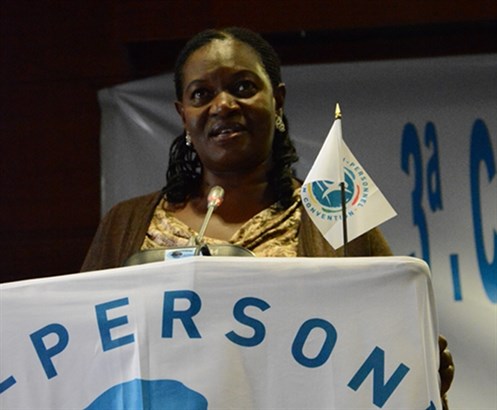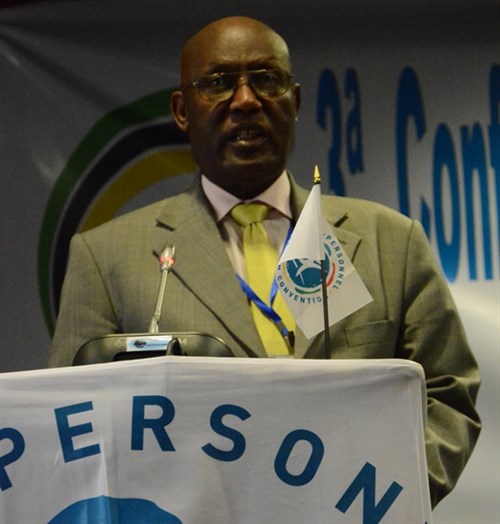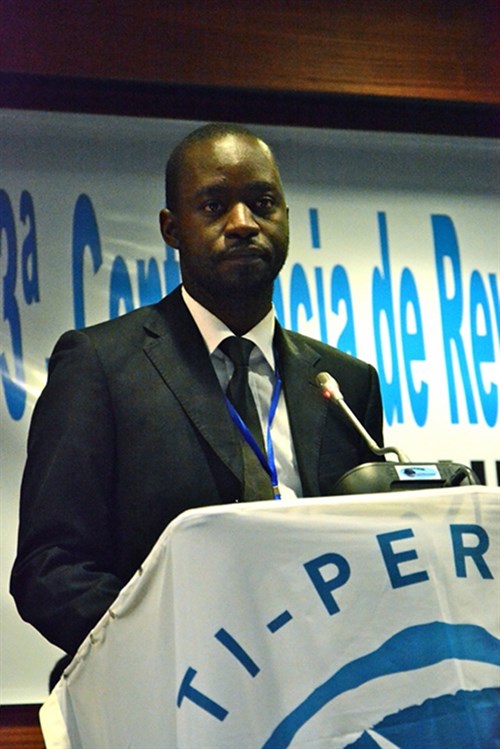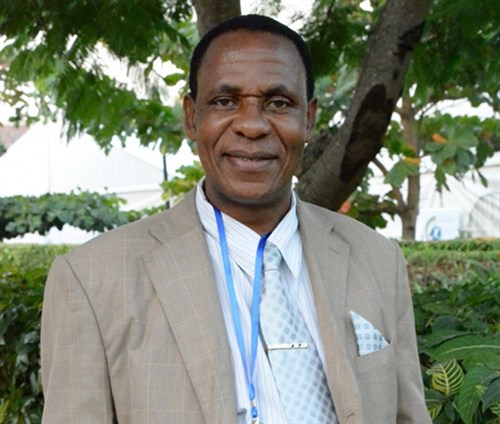27 June 2014
Survivors share hopes and recommendations at Maputo Conference
The Maputo Action Plan and discussions during the Maputo Conference have emphasized the importance of survivor participation in all aspects of public life, and in decisions that affect their lives. Five survivors of landmine and cluster munitions delivered personal messages on the final day of the Conference. They were introduced by ICBL Ambassador Tun Channareth, who accepted the Nobel Peace Prize on behalf of the ICBL in 1997.
Margaret Arach Orech, ICBL Ambassador
Uganda Landmine Survivors Association

Survivor participation is a guiding principle for the ICBL as articulated in the Cartagena and Maputo Action Plans. This has also been a result of the training programme Raising the Voices. Because of this effort, the strong voices of survivors are now heard all over the globe. However, with the achievements notwithstanding, the gap between commitment to survivor participation and outcomes is still a wide one.
This gap is linked to the physical, attitudinal, economic, social and legal barriers which daily constrain full participation of survivors. A survey by my organization revealed that 90% of the survivors in my country had never heard of the Mine Ban Treaty. The majority still lack the information and skills to enable them to participate effectively.
We need to take deliberate steps to guarantee meaningful participation of survivors in all issues that concern them. We call on states to provide targeted support to survivors to make key information accessible to them. Let us commit to ensure effective participation of survivors in the social, economic and political life of their communities, of their countries and internationally.
Nothing About Us Without Us.
Bekele Gonfa
Survivors Recovery and Rehabilitation Organization, Ethiopia

Peer support is a simple and effective way to empower those affected by landmines or explosive remnants of war and to provide them psychosocial support. A person who has been injured by these weapons suffers not only from physical trauma, but also from intense emotional, psychological and social difficulties. A fellow survivor can better communicate challenges than can doctors, family and friends.
Peer support starts with the identification of persons with disabilities and landmine survivors who are traumatized and live in isolation. This is followed by provision of peer counseling. Once it is possible, they will be referred to available educational, vocational, health or orthopedic services. As such, peer support enables a full recovery for survivors.
The need for peer support is a key component of victim assistance and is also well stated in the Disability Rights Convention. We survivors, encourage donors to support our organizations to conduct peer support. We call for each state to include this approach in the health and social sectors and to make peer support workers available in hospitals and orthopedic centers.
Umarbek Pulodov
Tajikistan Campaign to Ban Landmines

In my country we are working to make sure that buildings are accessible to all persons with disabilities including survivors. This is very important for every part of our lives, from education to employment and reaching government services. Due to our efforts and the engagement of government, we have seen real improvements in accessibility to some new buildings; libraries, museums and ministries. But there are still many places that people cannot reach to fully participate in public and social life, especially privately owned spaces and in rural areas. In so many countries the promise of accessibility has a long way to go to take down the barriers.
Education and awareness of the right to accessibility is important. States must enforce standards and put in place official systems to monitor and assure that buildings are accessible. Organizations of persons with disabilities including survivors must be involved in the monitoring process. There must be penalties for both private and government sectors when they are not taking accessibility into consideration.
It doesn’t cost much, if you make buildings accessible first you save more, and making existing places accessible still has greater rewards than the costs.
Mamady Gassama
Senegalese Landmine Survivors Association

I was harmed by an antipersonnel mine in the middle of my town when I was 14 years old. If people like me have had a chance of success, it’s because early on our parents understood that we needed to carry on with our studies and defended that right. After my accident, I passed the entry exams for 9th grade in hospital – I didn’t miss a year and I was able to carry on with my studies. So now, I have a chance to compete in the job market, pretty much like anyone else.
Most other victims of my generation didn’t have that chance. After their accident or the accident within their family, due to the lack of support, they stopped studying, and today they face enormous difficulties with their socio-economic reintegration.
In order to ensure their economic independence, all child survivors and all children whose parents have been injured or killed by landmines should have access to quality education on an equal basis with other children. The government must ensure this right.
Luis Silvestre Wamusse
Mozambique Landmine Survivors Association (RAVIM)

About 80% of the Mozambican population, including victims of landmines, lives in rural areas with only limited access to specialized health services, physical rehabilitation, and education, employment, and training opportunities. Most government and NGO programs to help vulnerable populations do not extend to these communities. Despite limitations in their physical abilities, survivors struggle alongside their neighbors, working at subsistence farming, animal husbandry, cutting firewood, or charcoal production, to earn some living.
According to a recent study, the average age of victims is about 40. The greatest desire expressed by victims is to enjoy the last days of their lives with dignity, after having seen many of their dreams pass them by, to earn an honest living, and to fulfill their responsibilities as heads of their families.
Even once demining is finished in Mozambique, the pernicious impact of mines and ERW will continue to be felt in the lives of victims for many years to come.
In Mozambique, we have a plan designed by the government in partnership with civil society, to ensure a life of dignity for survivors. In this plan, survivors do not ask for charity, but that their rights be respected and that they have opportunities to show that they are responsible citizens with strengths, ambitions and talents to offer their communities and their country. Together, we must embrace the implementation of this plan with rigor and enthusiasm.


